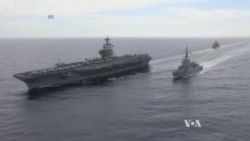WASHINGTON —
The United States is repositioning military assets closer to Iraq, as Baghdad braces for a possible attack by Sunni militants that have seized large swaths of territory in the country. Meanwhile in Washington, the risks and merits of some form of U.S. military intervention in Iraq is a topic of heated debate.
Shi’ites in Baghdad are flocking to recruitment centers to defend their city - the latest sign of worsening sectarian conflict in war-ravaged Iraq. To the north, militants of the Islamic State in Iraq and the Levant (ISIL) continue a brutal and effective campaign, seizing municipalities and military equipment, and posting images of them purportedly executing all who stand in their way.
The United States ordered an aircraft carrier into the Persian Gulf, which the Pentagon says provides "additional flexibility should military options be required.”
President Barack Obama said he understands what is at stake.
“Iraqi security forces have proven unable to defend a number of cities, which has allowed the terrorists to overrun a part of Iraq’s territory. And this poses a danger to Iraq and its people. And given the nature of these terrorists, it could pose a threat eventually to American interests, as well,” said Obama.
U.S. engagement in Iraq is urgently needed, according to Republican Congressman Michael McCaul, chairman of the House Homeland Security Committee.
“We need to stop this, the action needs to be now, not two weeks down the road,” said McCaul, speaking on ABC’s This Week program.
At the same time, he urged a diplomatic effort.
“We need to be very careful with any military strategy. Diplomatically, we need to bring the Sunni-Shia-Kurds together against the extremists,” said McCaul.
Another Republican, Senator Lindsey Graham, said the United States should engage in talks with Iraq's neighbor, Iran, on the crisis.
The White House said options are being prepared and reviewed.
“Any action we may take to provide assistance to Iraq, one security forces has to be joined by a serious and sincere effort by Iraq’s leaders to set aside sectarian differences. We cannot do it for them. And, in the absence of this type of political effort, short-term military action, including any assistance we might provide, will not succeed,” said Obama.
For now, Iraq’s exacerbated sectarian divides are producing more bloodshed and chaos by the day.
Shi’ites in Baghdad are flocking to recruitment centers to defend their city - the latest sign of worsening sectarian conflict in war-ravaged Iraq. To the north, militants of the Islamic State in Iraq and the Levant (ISIL) continue a brutal and effective campaign, seizing municipalities and military equipment, and posting images of them purportedly executing all who stand in their way.
The United States ordered an aircraft carrier into the Persian Gulf, which the Pentagon says provides "additional flexibility should military options be required.”
President Barack Obama said he understands what is at stake.
“Iraqi security forces have proven unable to defend a number of cities, which has allowed the terrorists to overrun a part of Iraq’s territory. And this poses a danger to Iraq and its people. And given the nature of these terrorists, it could pose a threat eventually to American interests, as well,” said Obama.
U.S. engagement in Iraq is urgently needed, according to Republican Congressman Michael McCaul, chairman of the House Homeland Security Committee.
“We need to stop this, the action needs to be now, not two weeks down the road,” said McCaul, speaking on ABC’s This Week program.
At the same time, he urged a diplomatic effort.
“We need to be very careful with any military strategy. Diplomatically, we need to bring the Sunni-Shia-Kurds together against the extremists,” said McCaul.
Another Republican, Senator Lindsey Graham, said the United States should engage in talks with Iraq's neighbor, Iran, on the crisis.
The White House said options are being prepared and reviewed.
“Any action we may take to provide assistance to Iraq, one security forces has to be joined by a serious and sincere effort by Iraq’s leaders to set aside sectarian differences. We cannot do it for them. And, in the absence of this type of political effort, short-term military action, including any assistance we might provide, will not succeed,” said Obama.
For now, Iraq’s exacerbated sectarian divides are producing more bloodshed and chaos by the day.





